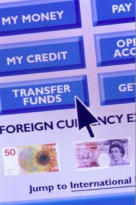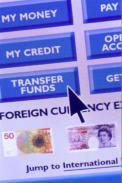Money lost when sent to India - Transferring money to India & abroad
safely
How to resolve disputes with your bank in India Non Resident Indians or anyone overseas sending money to India in the form of a personal cheque from their NRI accounts in India should be aware of the numerous cases where money sent gets lost to fraud. Sadly when it comes to recovering money lost in transit in such cases, the time involved in investigating and correspondence back and forth from your residence overseas and bank offices in India can take up a lot of time. Depending on the bank involved time to resolve such issues can be really frustrating for account holders who find they have lost money and waiting for a credit can test anyone's patience. Unfortunately when it comes to customer service, some of our Indian banks do not entirely live up to the mark. Its not only the NRIs who send money home suffer but also family members waiting for funds to arrive suffer hardships and spend endless hours trying to track the missing money.PROTECTING YOUR MONEY - SENDING MONEY TO INDIA SAFELY
Occasionally I receive emails for this websites question/answer pages from people who have unfortunately fallen victim to such fraud. While fraudsters are always on the lookout for some loop hole they can take advantage of to get at your money, When it comes to sending money to India there are a few things NRI’s can do to protect their funds. • Deal only with reputable banks. Not all banks are the same when it comes to customer service. Surprisingly many banks will spend large amounts of money on advertising to get new customers to open accounts with them but their customer service to keep their customers satisfied is anything but satisfactory. • When sending money to India by cheque drawn on your personal NRI accounts in India, Make sure you mark the cheque as 'Account Payable Only'. This is a simple procedure that involves you to just write on your cheque the words 'AC/Pay Only' • When a cheque is made as 'Account Payable' then it cannot be cashed over the counter liker a bearer cheque. The person who gets the cheque has to deposit the cheque in his/her account. This protects you to some extent as the account where your cheque was deposited can always be traced. o Unless you make your cheque 'Account Payable' only, your cheque is a bearer cheque and can be cashed by anyone.BANKING OMBUDSMAN INDIA - RESOLVING BANKING PROBLEMS
The Ombudsman scheme in India is a system to resolve customer complaints against their banks in a quick and inexpensive manner. You do not need a lawyer to represent you and you can file complaints even on the Internet. A complainant may file a complaint with the Banking Ombudsman simply by writing on a plain paper. He can also file it online at https://secweb.rbi.org.in/BO/compltindex.htm or by sending an email to the Banking Ombudsman. There is also a prescribed form for filing a complaint, which is available with all the branches of the banks. However, it is not necessary to use this format. The complainant should, however, incorporate all the required information. (Source: Reserve Bank of India)) For filing a complaint before the Banking Ombudsman, it is necessary for a complainant to first attempt to find a satisfactory solution directly with his bank by making a written representation to the bank named in the complaint. The complaint should, however, be made before expiry of period of one year after the cause of action has arisen.Guidelines For Sending Money to India
1. When sending cheque to India by mail, make sure you use registered mail. 2. It is always advisable to send money to India by wire transfer or transfer money online to the account of your loved ones. This just involves a one time setup and is safe and convenient. 3. Western Union is another option for those of you who wish to send money to India. 4. NEVER send money through money transfer agents who offer home delivery of your money at slightly higher than bank rates. There are endless stories of people loosing large amounts of money to such agents. Typically the contact abroad claims to have sent the money, and the contacts in India, deny receiving the money. Needless to say, many such transactions are also illegal. If you send money to India on a regular basis to your family members then it is better to open an account for your loved ones in India and deposit money directly through your bank into their bank account. By virtue of online banking access that is offered by many banks in India, you can also check to make sure your money is safely credited to your loved ones bank accounts. If unfortunately you do end up becoming a victim of fraud when your cheque goes into the wrong hands and you end up loosing money from your account in India, keep a record of your correspondence with your bank. Unless you have been negligent the banks do have liability to protect your money. If you do not get satisfaction from first level of customer service then do write to the higher banking authorities of the concerned bank. Many customer level people do not have the authority to correct mistakes and keep passing the buck.Tips when requesting customer service
Problems do happen and mistakes are sometimes made. Don't loose your temper and make threatening calls or write threatening letters. Keep your focus on getting the problem resolved. Regardless of who is at fault, it is in your best interest to get the problem resolved as soon as possible. When you send threatening letters they are not read by computers but by real human beings. They can become aggravated and add to your problem. So avoid the blame game. If your problem is not resolved within a reasonable time you have the option of filling a complaint with the banking ombudsman.

Disclaimer: Information provided is for general knowledge only and should not be deemed to be professional advice. For professional advice kindly consult a
professional accountant, immigration advisor or the Indian consulate. Rules and regulations do change from time to time. Please note that in case of any variation
between what has been stated on this website and the relevant Act, Rules, Regulations, Policy Statements etc. the latter shall prevail.
© Copyright 2006 Nriinformation.com



List of Banks under liquidation - Is Your Money Safe in Indian Banks
How safe is your safety deposit box in India . . . lost locker key?

NRI - OCI - PIO Guide & Information
Money lost when sent to
India - Transferring money
to India & abroad safely
How to resolve disputes with your bank in India Non Resident Indians or anyone overseas sending money to India in the form of a personal cheque from their NRI accounts in India should be aware of the numerous cases where money sent gets lost to fraud. Sadly when it comes to recovering money lost in transit in such cases, the time involved in investigating and correspondence back and forth from your residence overseas and bank offices in India can take up a lot of time. Depending on the bank involved time to resolve such issues can be really frustrating for account holders who find they have lost money and waiting for a credit can test anyone's patience. Unfortunately when it comes to customer service, some of our Indian banks do not entirely live up to the mark. Its not only the NRIs who send money home suffer but also family members waiting for funds to arrive suffer hardships and spend endless hours trying to track the missing money.PROTECTING YOUR MONEY -
SENDING MONEY TO INDIA
SAFELY
Occasionally I receive emails for this websites question/answer pages from people who have unfortunately fallen victim to such fraud. While fraudsters are always on the lookout for some loop hole they can take advantage of to get at your money, When it comes to sending money to India there are a few things NRI’s can do to protect their funds. • Deal only with reputable banks. Not all banks are the same when it comes to customer service. Surprisingly many banks will spend large amounts of money on advertising to get new customers to open accounts with them but their customer service to keep their customers satisfied is anything but satisfactory. • When sending money to India by cheque drawn on your personal NRI accounts in India, Make sure you mark the cheque as 'Account Payable Only'. This is a simple procedure that involves you to just write on your cheque the words 'AC/Pay Only' • When a cheque is made as 'Account Payable' then it cannot be cashed over the counter liker a bearer cheque. The person who gets the cheque has to deposit the cheque in his/her account. This protects you to some extent as the account where your cheque was deposited can always be traced. o Unless you make your cheque 'Account Payable' only, your cheque is a bearer cheque and can be cashed by anyone.BANKING OMBUDSMAN INDIA -
RESOLVING BANKING PROBLEMS
The Ombudsman scheme in India is a system to resolve customer complaints against their banks in a quick and inexpensive manner. You do not need a lawyer to represent you and you can file complaints even on the Internet. A complainant may file a complaint with the Banking Ombudsman simply by writing on a plain paper. He can also file it online at https://secweb.rbi.org.in/BO/compltindex.htm or by sending an email to the Banking Ombudsman. There is also a prescribed form for filing a complaint, which is available with all the branches of the banks. However, it is not necessary to use this format. The complainant should, however, incorporate all the required information. (Source: Reserve Bank of India)) For filing a complaint before the Banking Ombudsman, it is necessary for a complainant to first attempt to find a satisfactory solution directly with his bank by making a written representation to the bank named in the complaint. The complaint should, however, be made before expiry of period of one year after the cause of action has arisen.Guidelines For Sending Money to
India
1. When sending cheque to India by mail, make sure you use registered mail. 2. It is always advisable to send money to India by wire transfer or transfer money online to the account of your loved ones. This just involves a one time setup and is safe and convenient. 3. Western Union is another option for those of you who wish to send money to India. 4. NEVER send money through money transfer agents who offer home delivery of your money at slightly higher than bank rates. There are endless stories of people loosing large amounts of money to such agents. Typically the contact abroad claims to have sent the money, and the contacts in India, deny receiving the money. Needless to say, many such transactions are also illegal. If you send money to India on a regular basis to your family members then it is better to open an account for your loved ones in India and deposit money directly through your bank into their bank account. By virtue of online banking access that is offered by many banks in India, you can also check to make sure your money is safely credited to your loved ones bank accounts. If unfortunately you do end up becoming a victim of fraud when your cheque goes into the wrong hands and you end up loosing money from your account in India, keep a record of your correspondence with your bank. Unless you have been negligent the banks do have liability to protect your money. If you do not get satisfaction from first level of customer service then do write to the higher banking authorities of the concerned bank. Many customer level people do not have the authority to correct mistakes and keep passing the buck.Tips when requesting customer
service
Problems do happen and mistakes are sometimes made. Don't loose your temper and make threatening calls or write threatening letters. Keep your focus on getting the problem resolved. Regardless of who is at fault, it is in your best interest to get the problem resolved as soon as possible. When you send threatening letters they are not read by computers but by real human beings. They can become aggravated and add to your problem. So avoid the blame game. If your problem is not resolved within a reasonable time you have the option of filling a complaint with the banking ombudsman.

N
RI Information
Informing
educating and connecting Indians across the globe


© Copyright 2006 Nriinformation.com



































